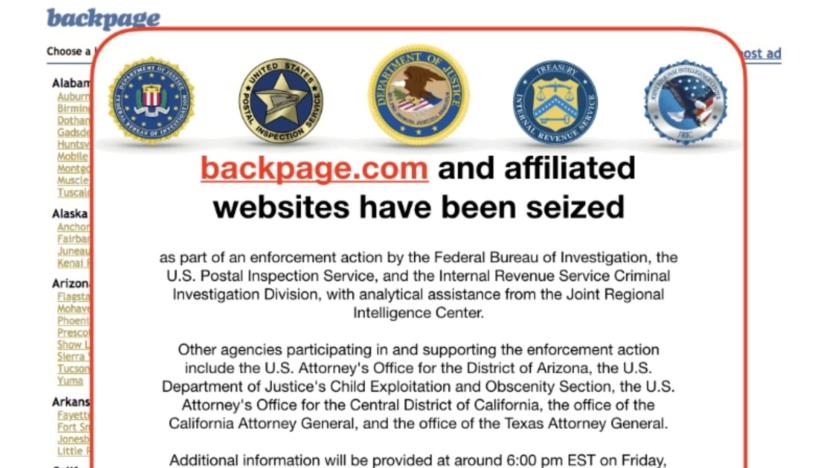sesta
Latest

Court reinstates lawsuit challenging online sex trafficking law
Civil liberty advocates are getting a second chance to challenge the legitimacy of the FOSTA-SESTA online sex trafficking law. An appeals court has reinstated a lawsuit claiming that FOSTA-SESTA violates First Amendment protections for free speech. While a judge had previously tossed the lawsuit on the grounds that plaintiffs Alex Andrews and Eric Koszyk didn't face a credible threat of prosecution, the appeals court disagreed. It determined that Andrews faced a real threat due to her sex worker support site, while FOSTA may have harmed Koszyk by denying him the ability to offer therapeutic massages anywhere on Craigslist.

Democrats want to study FOSTA-SESTA's impact on sex workers online
If you're concerned that FOSTA-SESTA seems built more to kick sex workers offline than to fight sex trafficking, you're not alone. House representatives and senators have introduced the Safe Sex Workers Study Act, a bill that would analyze the impact of FOSTA-SESTA on the health and safety of sex workers and help Congress make "informed" decisions. The politicians are concerned that banning sites from the "promotion of prostitution" only served to hurt the consensual sex industry by shutting down resources where workers could screen customers, set limits and discuss issues with their peers. This not only increased the chances for violence and health issues, but may have thwarted the very purpose of FOSTA-SESTA by pushing sex traffickers further underground.

Backpage.com CEO pleads guilty to human trafficking
Documents unsealed today by the Justice Department (PDF) reveal Backpage.com CEO Carl Ferrer pleaded guilty to federal conspiracy charges in Arizona on April 5th, a day before the site was seized and shut down. Additionally, attorneys general in California and Texas announced today that the site itself has entered a guilty plea to charges of human trafficking in Texas, while Ferrer pleaded guilty to conspiracy and three counts of money laundering in California. Several corporate entities tied to the site, including Backpage.com LLC, also entered guilty pleas to charges of money laundering. As a part of the deal that will see him serve a maximum of five years in prison, the prosecutors say Ferrer has surrendered the URLs of the site and its data to law enforcement, and that he will cooperate in the prosecution against others involved with the company -- namely co-founders and controlling shareholders Michael Lacey and James Larkin, who were indicted April 9th. The plea deal includes Ferrer's admission that a majority of the site's ads were for sex services, and that he conspired with others to launder proceeds from the ads after credit card companies and banks wouldn't do business with the site.

FOSTA-SESTA's real aim is to silence sex workers online
The US' latest attempt to silence sex workers and people working in the adult-entertainment industry has been a huge success. Just weeks after FOSTA-SESTA was passed, the bill has begun to chill free speech across the internet. A number of websites have had to either shut down or actively distance themselves from the notion that they support sex work. And the problem is only going to get worse as time goes on.

Backpage.com was seized by the federal government
Classifieds website Backpage.com has been seized and disabled by the federal government. When you visit the website now, you'll see a message saying it and all affiliated websites have been taken over "as part of an enforcement action by the Federal Bureau of Investigation, the US Postal Inspection Service and the Internal Revenue Service Criminal Investigation Division, with analytical assistance from the Joint Regional Intelligence Center." The message goes on to name a handful of other enforcement groups involved in the action and states that more information will be provided by the US Department of Justice later this evening. Backpage is the second largest classifieds website.

Craiglist blocks personal ads to protest anti sex-trafficking law
The passing of the controversial, ham-handed Stop Enabling Sex Traffickers Act (SESTA-FOSTA) has prompted Craigslist to close its personals section. The bill is designed to punish websites with criminal sanctions if they are seen to be facilitating sex work, as a personals ad could be. Unfortunately, the legislation is drawn so poorly that any website that connects people could be targeted. Which is what has prompted Craigslist to act, with all links in the area now pointing to a short statement.

Senate passes sex-trafficking bill that may lead to online censorship
Today, the Senate passed the controversial Stop Enabling Sex Traffickers Act (SESTA) and the bill now heads to the White House where Donald Trump is expected to sign it. While some groups like the Internet Association have backed the bill, many others have come out against it saying the bill will lead to online censorship and make it more difficult to find and prosecute sex traffickers. Those who've spoken out against SESTA include the National Organization for Women, the ACLU, the EFF, the Department of Justice as well as a variety of sex work rights organizations and sex trafficking victims' groups.

Bipartisan support grows for online sex trafficking bill
The bill aimed to curb online sex trafficking has gained support from 60 senators, which means it has enough backing to withstand a filibuster once it reaches the floor. Both republican and democrat lawmakers have put their weight behind the Stop Enabling Sex Traffickers Act, with three additional members of the GOP backing it this week Bloomberg reports. Previously, the Internet Association (which counts Amazon, Facebook and Google as members) was opposed to any changes to the Communications Decency Act's Section 230, but in November the organization changed its tune after vague wording was cleared up.

Anti-sex trafficking law could unintentionally cripple Wikipedia
After historically opposing changes to the Communications Decency Act's Section 230, web giants came out in favor of a proposed amendment to the law, which would punish a website for knowingly facilitating sexual exploitation. But, unlike the Internet Association (which includes Amazon, Google, and Facebook), Wikipedia stands opposed to the provision. Mainly, it's worried about the negative impact the broad-brush legislation may have on the little guy. In a Medium post, the Wikemedia Foundation's legal fellow Leighanna Mixter claims the the Stop Enabling Sex Traffickers Act (SESTA) could threaten its entire existence -- which may be overstressing it.

Internet giants now support bill to curb online sex trafficking
For ages, internet companies have fought changes to the Communications Decency Act's Section 230, which protects them from liability for content that might pass through their websites. They don't want to be sued because someone conducted sex trafficking on their sites without their knowledge. They've had a change of heart, though. The Internet Association (which includes Amazon, Facebook and Google) now supports the proposed Stop Enabling Sex Traffickers Act, which would explicitly punish online sites that facilitate exploitation, after lawmakers altered the bill to protect innocent sites against criminal charges and lawsuits.





